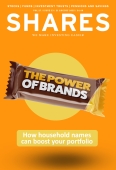Archived article
Please note that tax, investment, pension and ISA rules can change and the information and any views contained in this article may now be inaccurate.
How Allianz Technology Trust has beaten the market despite being underweight Nvidia and Microsoft

Once again the big US tech names have been a significant driver of returns in the technology sector and the wider markets in 2025. This has not applied across the board, but certainly the likes of Nvidia (NVDA:NASDAQ) and Microsoft (MSFT :NASDAQ) have been to the fore.
Which makes it all the more impressive that Allianz Technology Trust (ATT) has been able to outperform despite effectively having no choice but to be underweight (i.e. have a lower weighting in its portfolio than these stocks do in broad technology indices) both Nvidia and Microsoft this year.
That’s because both businesses are now so large that if the trust’s manager Mike Seidenberg were to hold them at their market weighting then they would breach maximum position size limits.
OUTPERFORMING AS RETURNS START TO DISPERSE
The company’s recent results for the six months to 30 June showed a total return in net asset value terms of 2.9% versus -0.2% for the Dow Jones World Technology Index (total return in sterling). Not spectacular but solid enough and there are signs that the market environment is moving in the trust’s favour.
As we hinted at the start, there has been greater dispersion between the so-called Magnificent Seven in the last eight-and-a-half months from impressive, to decent, to disappointing to frankly pretty disastrous for Tesla (TSLA:NASDAQ).
Allianz Technology Trust has benefited from being underweight Apple (AAPL:NASDAQ) – which has been badly hit by tariff uncertainty – and fellow underperformer Tesla, where Seidenberg scaled back exposure almost as soon as he took over running the trust in 2022.
As Winterflood analyst Shavar Halberstadt observes, ATT should ‘benefit from any sustained dispersion in equity markets, given the concentration of returns in Mag7 ‘super-megacaps’ was a challenge for its diversified portfolio with a mid-to-large cap bias’.
The analyst adds: ‘ATT commendably managed to roughly keep pace with the benchmark even through that environment, but there are signs that now a more hospitable moment has arrived.’
In Halberstadt’s view the current volatility is a good fit for the trust’s active, bottom-up approach which is made possible by its on the ground presence in Silicon Valley.
Halberstadt’s counterpart at Deutsche Numis, Gavin Trodd, agrees: ‘A greater dispersion of market returns favours an active approach, and we believe the manager is well-placed to capitalise on the widening opportunity set.
‘ATT takes a bottom-up stock picking approach driven by exposure to key themes,’ continues Trodd, ‘with relatively high turnover in a dynamic, fast-moving sector, and we believe this approach and the flexibility to invest lower down in the market cap spectrum in mid- and large-caps should serve it well in this market environment.’
HOW IS THE PORTFOLIO SHAPING UP?
As both analysts make clear, Seidenberg has chalked up solid performance since his tenure began in June 2022 with NAV total returns of 111% or 27.2% per year compared with 108% for the index (26.5% a year) and in line with rival trust Polar Capital Technology (PCT).
Included in the list of names outside the Mag7 which really contributed to performance in the first half were cloud services firm Cloudfare (NET:NYSE) and music streaming platform Spotify (SPOT:NYSE).
Among those added to the trust were Advanced Micro Devices (AMD:NASDAQ) – bought to increase the semiconductor and AI footprint in the portfolio – and Robinhood Markets (HOOD:NASDAQ). The trust sees the latter as benefiting from a strong underlying client base.
The company also took a position in business software group Intuit (INTU:NASDAQ), noting the company’s favourable execution across its suite of products and strong demand drivers as well as the introduction of AI-related features.
Exits included cloud-based monitoring and analytics platform Datadog (DDOG:NASDAQ), cloud-based relationship management outfit HubSpot (HUBS:NYSE) and cybersecurity firm Palo Alto Networks (PANW:NASDAQ).
The company also bought shares in Microsoft through period, even if for the reasons mentioned above it remains underweight the software giant.
TRADING AT A DISCOUNT
Despite continuing to buy back its own shares, Allianz Technology saw its discount widen through the first six months of the year, although it has subsequently narrowed a touch to -8.8% currently.
Mike Seidenberg remains effusive about the impact of AI and its strength as a theme: ‘Artificial intelligence is the single most important emerging technology and has the potential to disrupt every sector,’ he says.
‘It is a horizontal technology, thus it cuts across all the various vertical industries (health care, industrial, energy, retail, etc.) and is changing corporate workflows globally.
‘Every business we interact with is testing/trialing multiple use cases due to the potential inherent power it has to offer. It has the potential to touch the three most important drivers businesses care about – sell more things, create happier customers and decrease costs – and this makes it unique.’
Seidenberg notes this is reminiscent of the move to the cloud and wider digitisation and he believes it still has greater potential than other emerging technologies like quantum computing and blockchain.
The trust has an ongoing charge of 0.64% which is lower than its close competitor Polar Capital Technology at 0.77% and the wider 1%-plus trust average.
Important information:
These articles are provided by Shares magazine which is published by AJ Bell Media, a part of AJ Bell. Shares is not written by AJ Bell.
Shares is provided for your general information and use and is not a personal recommendation to invest. It is not intended to be relied upon by you in making or not making any investment decisions. The investments referred to in these articles will not be suitable for all investors. If in doubt please seek appropriate independent financial advice.
Investors acting on the information in these articles do so at their own risk and AJ Bell Media and its staff do not accept liability for losses suffered by investors as a result of their investment decisions.
 magazine
magazine








